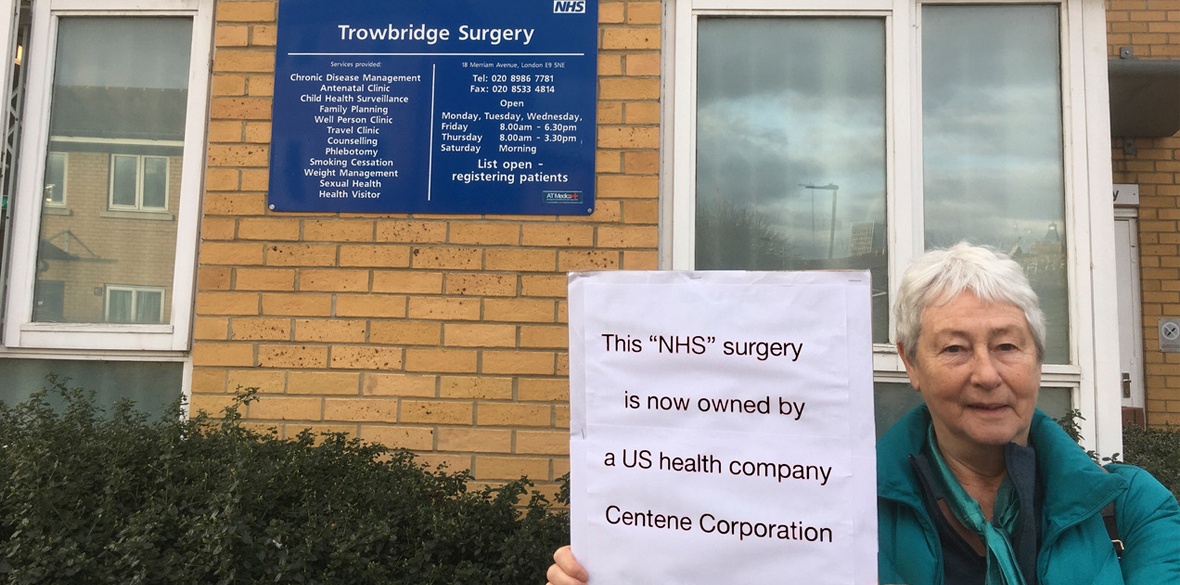This is the last article you can read this month
You can read more article this month
You can read more articles this month
Sorry your limit is up for this month
Reset on:
Please help support the Morning Star by subscribing here
CENTENE, a US health corporation expanding throughout the NHS, has been repeatedly fined in its native United States for medical and financial failures.
Missouri-based Centene is enthusiastic about Britain, which it says is one of its two overseas locations. It is so keen it is buying key British companies and key British personnel.
Centene is very big in the United States — it is the 42nd-biggest firm in the US, according to the Fortune 500 list of US firms.
Centene is bigger than Pepsi and Disney and almost as big as Boeing.
It has grown by becoming a big supplier in the marketplace of the US’s primitive public healthcare systems, Medicare, Medicaid and the Affordable Care Act (ACA).
Medicare provides state-funded healthcare for the old, Medicaid does the same for the very poor, while the ACA tries to keep down private health insurance costs for the rest.
Centene specialises in “managed care,” the US term for keeping down healthcare costs for insurers and public programmes by trying to ration services, promote cheaper treatments and use incentives to keep people out of hospital.
Centene might already be a huge US corporation, but it is very interested in buying into Britain.
Through mergers and buyouts Centene made a big expansion in running GP practices earlier this year — its main British subsidiary, called Operose took control of 58 GP practices, covering half a million patients, leading to protests reported by the Morning Star.
That’s just part of Centene’s British expansion. Last January Centene bought “significant control” of British private health firm Circle.
Firms must notify Companies House about who owns and controls them — Circle Health registered that Centene’s ownership had jumped to somewhere between 25 per cent and 50 per cent of the firm.
At the same time, Circle took over another British private hospital firm, BMI Healthcare.
The Circle-BMI takeover creates a big network of private hospitals, part-owned by Centene, all of which do NHS operations under privatisation schemes.
Centene is also a growing player in NHS integrated care systems. These are regional boards supposed to improve health by integrating NHS and social care.
Integrated care systems are part of Health Secretary Matt Hancock’s NHS Long Term Plan.
2019’s Tory election manifesto promised to enshrine this plan in law, so integrated care systems are a manifesto commitment.
Integrating NHS and social care is a political prize sought by many, but critics say integrated care systems are also a route to rationing and privatisation — the systems will substitute regional agreements for national standards of care and place private companies in powerful positions in the integrated care system boards.
Centene UK is one such firm. In 2018 Centene hired Samantha Jones, formerly an NHS England director in charge of integration of health and social care, as the chief executive of its British subsidiary Operose.
Centene also in 2017 won a contract to help deliver Nottingham’s sustainability and transformation plan, a precursor of its integrated care system.
Centene hired Jones to help with its privatisation plans. Then in March Boris Johnson hired the same Samantha Jones as one of his “special advisers” on health.
This signals that Johnson wants to push more NHS work to private contractors, and that Centene is in a key position to get those contracts.
Centene has other good reasons to expect more work from NHS “integration.”
Its Spanish subsidiary runs what is often quoted as a model for integration. Centene owns Spanish health firm Ribera Salud (“Riverside Health”), which was given an overarching contract to run integrated health and care in Alzira, Valencia.
Supporters say the “Alzira model” shows how health and care can be integrated, but opponents view it as a privatisation scheme, where a corporation was given one “outputs-based” contract covering a whole region.
Centene is well placed to pick up more British NHS privatisation work, but judging by its US record, this could be bad news.
Last January healthcare officials in Iowa announced they were withholding $44 million (£31.6m) in payments from the Centene subsidiary that runs the state’s Medicaid scheme.
Iowa switched from a publicly run Medicaid scheme to one administered by private firms including Centene, but officials had to withhold payments because they say Centene is not paying the doctors and hospitals who actually carry out treatment on time.
When Iowa gave Centene the privatised Medicaid contract in 2018, the main newspaper in the state, the Des Moines Register — Des Moines is the prettily named state capital city of Iowa — investigated the firm and found Centene subsidiaries faced “a host of fines.”
The Des Moines Register totalled up $23.6m (£17m) in fines since 2013. Centene was fined for not providing enough doctors.
It was fined $1.5m (£1.2m) in Washington State in 2017 and it also settled a lawsuit with Kentucky with a $7.5m (£5.4m) payment in 2016, for pulling out of an unprofitable Medicaid programme before the contract was up.
Centene also paid $4.5m (£3.2m) in 2016 to settle a court case brought by nurses who said the firm had wrongly refused to pay them overtime.
As the Morning Star revealed earlier this month, in March Ohio sued Centene for what its attorney general called “an elaborate scheme to maximise company profits at the expense of the Ohio Department of Medicaid and the state of Ohio.”
Attorney general Dave Yost said: “Corporate greed has led Centene and its wholly owned subsidiaries to fleece taxpayers out of millions.
“This conspiracy to obtain Medicaid payments through deceptive means stops now.”
He said the firm was making money by misrepresenting costs, resulting in “millions of dollars of overpayments” by the state.
Centene denies the charges, but if this is what Centene does in its native US, we might big problems as it expands in Britain.









